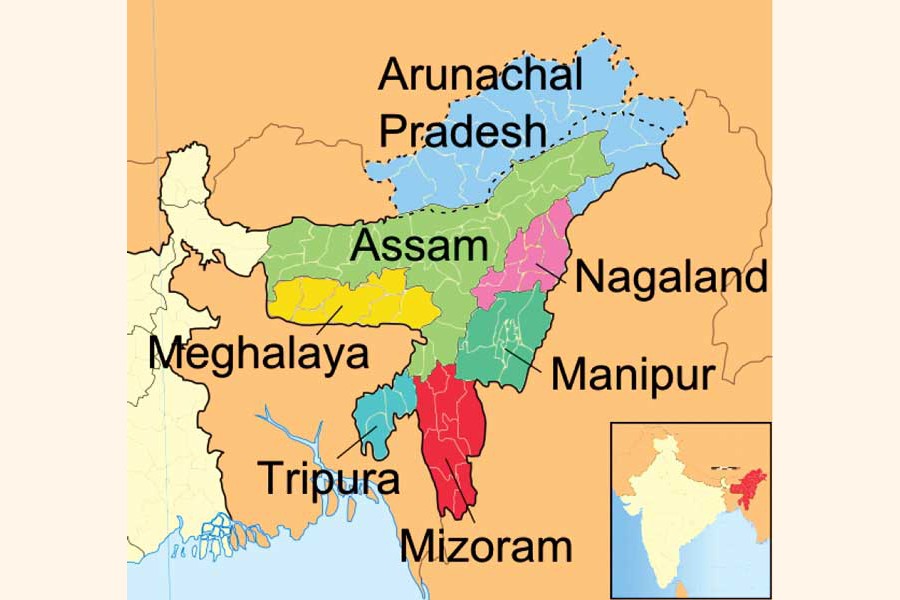Seven north-eastern states of India -- Arunachal Pradesh, Assam, Manipur?, Meghalaya?, Mizoram?, Nagaland? and Tripura -- share an international border of 5,182 kilometres with neighbouring countries. Thus, India has 1,395 kilometres of border with Tibet, China, in the north, 1,640 kilometres with Myanmar in the east, 1,596 kilometres with Bangladesh in the south-west, 97 kilometres with Nepal in the west, and 455 kilometres with Bhutan in the north-west.
These Indian provinces, collectively known as Seven Sisters States, are comprised of an area of 262,230 square kilometres, almost 8.0 per cent of the territory of India. Total population of the north-eastern India is 46 million with 68 per cent of that living in Assam alone. Literacy rate in these states, excepting in Arunachal Pradesh and Assam, are higher than the national average of 74 per cent.
The Seven Sisters are apparently the corridor between the South Asian Association for Regional Cooperation (SAARC) and the Association of Southeast Asian Nations (ASEAN) plus China. But poor infrastructure and vulnerable connectivity because of their location in a land-locked region have made them backward. Compared to mainland India, north-eastern part of the country seems to be a neglected region.
However, India's recent initiatives such as the Ministry of Development of North Eastern Region, the North East Special Infrastructure Development Scheme, the North Eastern Council, and the North Eastern Development Finance Corporation Ltd have created some hope for the region. The last one is a public limited company meant for providing assistance to micro, small, medium and large enterprises. Such initiatives also include the North Eastern Regional Agricultural Marketing Corporation Limited (NERAMAC), the Sikkim Mining Corporation Limited (SMC) and the North Eastern Handlooms and Handicrafts Development Corporation (NEHHDC), apart from the Indian government's 'Act East Policy'.
Each provincial government has also taken separate initiatives to attain economic development through promotion of trade, investment and commerce as well as establishment of regional connectivity with the neighbouring countries including Bangladesh. To reduce transportation cost of international trade they are more than proactive to have transshipment facilities through rail, road and water ways of Bangladesh and use Chittagong and Mongla ports. The India-Bangladesh Stakeholders' Meet 2019, held in Guwahati, Assam, on October 22-23, 2019, was one of proactive initiatives of the Indian authorities.
The Bangladesh government, during the recent visit of Prime Minister Sheikh Hasina to New Delhi, offered connectivity to the Seven Sisters. If Bangladesh can use this access for economic benefits, it could be a win-win deal for both countries. For example, if Bangladesh gets a justified rate of transshipment fees from each of India's shipments to and from Chittagong or Mongla ports, and to or from West Bengal to the north-eastern provinces, it could be a great source of revenue for Bangladesh.
Therefore, ensuring justified stake from this connectivity deal is primarily important for Bangladesh. Secondly, this connectivity is in the form of transshipment. That means Indian carriers will carry their goods up to Bangladesh boarder, and then Bangladeshi carriers will carry these goods to the ports or to another border point. Thus transportation sector of Bangladesh -- roads, railways and waterways -- will get an additional scope of earning from this transhipment agreement.
This connectivity will obviously be 'trade creating' for Bangladesh stakeholders. It will also reduce the seven sisters' route to nearest port or mainland India up to half of their current distance. So, the Indians will immensely benefit by saving fuel cost up to half of their existing expenses.
Before implementing this deal, Bangladesh authorities should ensure that local stakeholders are prepared to reap its trade benefits. Otherwise, this may cause trade diversion from Bangladesh. Every action in international trade has a two-way possibility of trade creation or trade diversion.
For example, connectivity to the north eastern states could create trade for Bangladeshi stakeholders through transshipment fees, transportation earnings, development of distribution network and warehouse earnings. If Bangladesh fails to avail of reciprocal facilities from state-level governments, the expected easy/low cost/duty-free market access for Bangladeshi products to the Seven Sisters may remain beyond its reach.
Negotiations with state governments are important. The complexities of Teesta river water-sharing negotiations are a case in point. While India's central government pledged to make a deal with Bangladesh counterpart, the West Bengal provincial government is not ready to sign the deal at all.
In this age of globalisation, you are either a market or a marketer. If Bangladesh fails to create trade from the north-eastern connectivity deal, it will divert our trade and Bangladesh will be a lucrative market for the north-eastern states' businesses. Bangladesh can source many raw materials from there, like lime stone, coal, fly ash, tea, spices, medicinal plants, coir, bamboo and rural craft to process these to manufacture finished products before exporting elsewhere to or even re-exporting to the north-eastern market.
India's north-eastern region could be a good market for Bangladeshi fresh vegetables, fish, sea food, and other consumer goods. But to secure market access, the government has to take the lead to avail of this commitment from the north-eastern provincial governments, to communicate availability of facilities to the private sector stakeholders and provide policy support for preparing the Bangladeshi business communities for accessing the market in a competitive manner. Otherwise it could just make Bangladesh a market instead of being a marketer there. It is high time that the Bangladesh government and stakeholders decided if India's north-eastern region would be a market or a marketer for Bangladesh.
Md. Joynal Abdin is a development researcher and acting Secretary at Dhaka Chamber of Commerce and Industry (DCCI)


